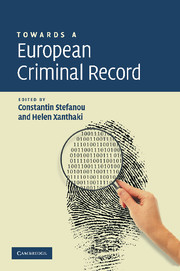Book contents
- Frontmatter
- Contents
- List of contributors
- Preface and acknowledgements
- 1 Introduction: How did the idea of a European Criminal Record come about?
- PART I
- PART II
- 5 The European Criminal Record in Austria
- 6 The European Criminal Record in the Czech Republic
- 7 The European Criminal Record in Germany
- 8 The European Criminal Record in Greece
- 9 The European Criminal Record in Hungary
- 10 The European Criminal Record in Ireland
- 11 The European Criminal Record in the Netherlands
- 12 The European Criminal Record in Slovenia
- 13 The European Criminal Record in Slovakia
- 14 The European Criminal Record in Spain
- 15 The European Criminal Record in England and Wales
- PART III
- 19 Conclusions
- Index
8 - The European Criminal Record in Greece
Published online by Cambridge University Press: 13 July 2009
- Frontmatter
- Contents
- List of contributors
- Preface and acknowledgements
- 1 Introduction: How did the idea of a European Criminal Record come about?
- PART I
- PART II
- 5 The European Criminal Record in Austria
- 6 The European Criminal Record in the Czech Republic
- 7 The European Criminal Record in Germany
- 8 The European Criminal Record in Greece
- 9 The European Criminal Record in Hungary
- 10 The European Criminal Record in Ireland
- 11 The European Criminal Record in the Netherlands
- 12 The European Criminal Record in Slovenia
- 13 The European Criminal Record in Slovakia
- 14 The European Criminal Record in Spain
- 15 The European Criminal Record in England and Wales
- PART III
- 19 Conclusions
- Index
Summary
Introduction
The legal status and regulation of criminal records in Greece followed a two-tiered approach, common in most European legal orders. Originally, the criminal record constituted nothing else but a tool for the detection of crimes and a parameter for the determination of the penalty to be imposed upon conviction. A prevention parameter, in the sense that an ex-offender should not be given the chance to indulge in criminal conduct, was also considered inherent in the criminal record function. The emphasis, however, remained clear: the criminal record was an instrument of state policy, a public document freely used by the courts and law enforcement agencies. It was only in the 1980s, and in view of technological developments and the subsequent emerging need to shield the individual both from the increasing use (and misuse) of personal data by the national administration within a state and the unhindered transnational flow of such information to be freely used by anybody, that the criminal record also became a personal file, replete with sensitive information pertaining to that particular individual. The tension between the criminal policy tool, to be owned and used by the state at its discretion, and the personal data file, to be safeguarded from interference or even use by third parties, is eloquently reflected in the regulation of the criminal record in the Greek legal order.
In 1951 the Greek Code of Criminal Procedure (CCrP) came into force and criminal records were regulated in its Articles 573–580.
- Type
- Chapter
- Information
- Towards a European Criminal Record , pp. 168 - 180Publisher: Cambridge University PressPrint publication year: 2008



